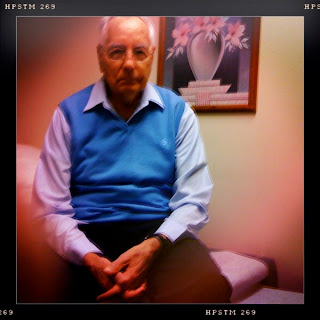 This is my father. His name is also Paul, though our middle names are different. So too was his father's name Paul. Born in 1919 in rural southeastern Pennsylvania, in a small town near Butler called North Washington, he never knew his own father. As much as I have uncovered reveals that Paul Sr. left his wife and three children to move West due to asthma. I have a distinct feeling that the reality was more complex than the story. What I do know is that my grandfather's legacy haunts my small family. I am my father's only child, born when he was 45 years old and, most likely, resigned to a life without children. Surprise. Like many fathers and sons our relationship was not without struggle, but we have grown, over the years, to love and accept one another. As a matter of fact, there are times when the love I feel for my father literally hurts my heart. Though his expression of it was hard won over the years, I now know that he loves me too. My family was small - three. In 1991 it was reduced to two. I am now watching it fade to one.
This is my father. His name is also Paul, though our middle names are different. So too was his father's name Paul. Born in 1919 in rural southeastern Pennsylvania, in a small town near Butler called North Washington, he never knew his own father. As much as I have uncovered reveals that Paul Sr. left his wife and three children to move West due to asthma. I have a distinct feeling that the reality was more complex than the story. What I do know is that my grandfather's legacy haunts my small family. I am my father's only child, born when he was 45 years old and, most likely, resigned to a life without children. Surprise. Like many fathers and sons our relationship was not without struggle, but we have grown, over the years, to love and accept one another. As a matter of fact, there are times when the love I feel for my father literally hurts my heart. Though his expression of it was hard won over the years, I now know that he loves me too. My family was small - three. In 1991 it was reduced to two. I am now watching it fade to one.Our culture is ill equipped to deal with death. As a result, its citizens are ill equipped to deal with death. Few wish to talk about it; fewer still address personal mortality in any real and meaningful way. It is something that will occur “later”. So when the time comes, as it inevitably will for each and every one of us, that we lose a loved one or face our own demise, we find that even the strongest faith or belief in some transcendent reality can be shaken to its core.
In my own journey witnessing my father’s decline (which appears to be accelerating towards its zenith) I find that the dualities of my belief system stand in stark relief to the transcendent quality of his passage. Prior to being put on hospice care, days and weeks were spent in hospitals and doctors’ offices where any number if indignities were imposed upon my father. Anyone who has spent any time at all in the hands of the allopathic medicine community can attest to the fragmentation, disintegration, and brokenness of western medicine. My father tolerated the poking and prodding, the uncleanliness, the dispassionate treatment of a myriad of doctors, nurses, technicians, caretakers, etc. that paraded through his room with a level of dignity that is impossible to capture in words. This is why I began documenting what I saw as visual representations of this perception. His hands, though riddled with tubes, tape, and needles rested placidly in his lap.

Though too weak to stand, he sat in his chair gazing out at the street scene under his window, periodically asking questions I had answered not five minutes before. In his gown and blanket he reminded me of yogis I had seen photographed. Through the indignities of his situation, his intrinsic dignity remained. I wondered, is this the soul?
Therein lies another strong dualism: though the body decays, something palpable remains that is immutable. One can feel it in the presence of any individual, but in the dying it is particularly strong. I can think about my father merely three months ago, when he was walking, dancing, alert, and active and trace his decline to the present moment where he is weak, small, retracted, and incoherent. I can visualize this as a senseless and cruel set of circumstances reducing what I formerly knew as my father to a mere shadow of his former self or I can visualize this as a series of moments against the backdrop of an unchanging soul – a rising and falling of cosmic manifestation within the trajectory of divinity.
Though I struggle each and every day with the immanent loss of my last remaining parent, I also know that I am in the presence of the most sacred and universal of cycles – a cycle that gives value to existence and can serve as the deepest of reminders of that from which we are born and that to which we return – spirit.





